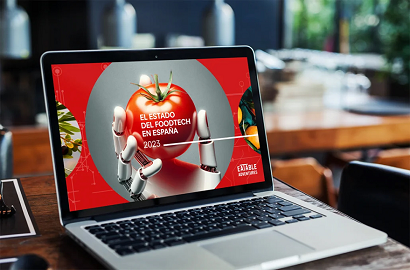Spanish foodtech ecosystem remains one of world’s most dynamic

It attracted 226 million euros of investment in 2023
In 2023, investment in the global foodtech ecosystem suffered from the consequences of the current geopolitical context and the economic crisis. However, in Spain the industry has managed to remain more stable, according to data from the fourth edition of "The State of Foodtech in Spain 2023" annual report, prepared by Spanish foodtech accelerator Eatable Adventures, which highlights that it is one of the most dynamic in the world.
Spanish companies in the industry attracted 226 million euros in investment last year. The report underlines the strength and resilience of the national ecosystem despite what it considers a slight decline of 16% compared to the previous year.
And that decrease is much more moderate than the global trend, since if we focus on the second quarter of the financial year, the overall drop was 61%, falling from $5.9 billion in 2022 to $2.3 billion worldwide a year later.
International investors
Pre-seed and seed funding rounds continued to attract national and international investors in Spain. In 2023, 38.9% of the startups included were at the seed stage, while 29% were at the earlier stages. Among the international investors that maintained their interest in these companies, the report highlights the ProVeg Incubator, North South Ventures, Big Idea Ventures and Bynd Venture Capital.
The number of Spanish foodtech startups remained stable in 2023, with a total of 420. According to Eatable Adventures, the key challenges driving its disruptive technology proposals are those linked to climate change, the exponential growth of the world's population, and the rising costs associated with food production.
Main sub-sectors
Companies in the agri-food technology industry are distributed throughout the autonomous communities; Madrid for example accounts for 34.2% of the total (6.6 points more than in 2022) and Catalonia for 30.3% (4.6 points more). 41% of the total (a six-point increase) fall into the food production and processing category. Restaurant tech and delivery (25%), agritech (21%) and retail and logistics (13%) come next.
Crop automation systems remain the main driver in the agritech category. In food production and processing, the creation of new products with innovative ingredients grew by 10.5%. In retail, the use of smart tags increased by almost 8%, and in restaurant tech, management platforms continue to lead the way.
A strong female presence
The Eatable Adventures report highlights other factors in the industry, such as company size. 60% in fact have between one and five employees, and 36% have a female member of staff, in contrast to the national average of 18%.
From the study, Eatable Adventures managing partner Mila Valcárcel highlights the fact that in 2023 "we have not only witnessed the resilience of our ecosystem, but also the consolidation and market launch of disruptive technologies, such as the arrival in the retail channel of the first 3D bioprinted vegetable bacon, by Cocuus and Foody's. This achievement highlights Spain's technological robustness, reaffirming its leading position in the international foodtech sector.
Photo: Eatable Adventures




